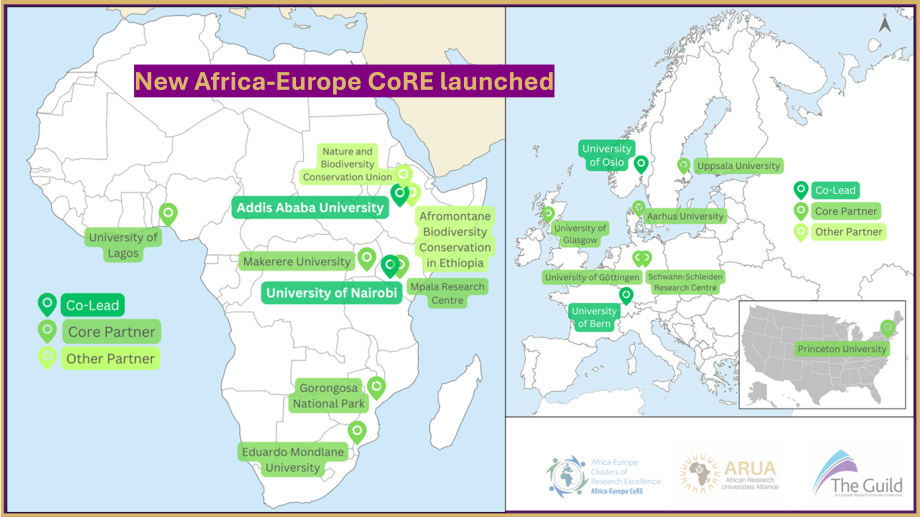New Africa-Europe CoRE launches to advance integrative conservation and strengthen global research partnerships

The Guild and ARUA are delighted to introduce the latest addition to the Africa-Europe Clusters of Research Excellence (CoRE): the CoRE in Integrative Conservation Biology Research and Training. The new CoRE answers a call from over 200 researchers on both continents to safeguard Eastern Africa’s biodiversity amid climate change, while addressing local community needs.
The CoRE will design undergraduate and postgraduate programs in remote sensing, ecological modelling, R-programming, and biodiversity digital twins. The aim is to strengthen local expertise and advance Africa’s transition toward a digitally empowered and environmentally resilient future. A multidisciplinary approach ensures that conservation strategies are both scientifically rigorous, socially relevant, striking a balance between ecosystems and human needs.
Aligning biodiversity conservation with socioeconomic needs is essential for sustainable solutions amid the escalating climate crisis. This requires advanced training in monitoring and impact assessment. In response, it is crucial for African and European universities to collaborate to promote impactful science, interdisciplinary training, and international partnerships, addressing global challenges such as climate change, human–wildlife conflicts, and sustainable conservation.
The CoRE aligns with the green transition priority area of the AU-EU Innovation Agenda which aims to provide tangible impact in both Africa and Europe as part of the EU’s Global Gateway strategy and the AU’s Agenda 2063. The CoRE currently includes 16 organisations across 12 countries, including ARUA and Guild universities, other universities spread across the globe and private industry.
This brings the total number of Africa-Europe CoREs to twenty-two, marking another milestone in strengthening equitable collaborative research partnerships across continents.
John Gyapong, Secretary-General of ARUA, said: “The launch of the Africa-Europe CoRE in Integrative Conservation Biology reaffirms our commitment to equitable partnerships and advancing interdisciplinary science to protect Africa’s biodiversity amid climate challenges.”
Jan Palmowski, Secretary-General of The Guild, said: “The biodiversity of the Eastern Afromontane Biodiversity Hotspot (EABH) and the East African savanna are unique, and they are fundamentally threatened by Climate Change. This is an important area where researchers across continents must work together, pooling their expertise, to ensure outcomes that are good for the environment, that strengthen local economies, and protect societies, so that they may have long-term opportunities to prosper.”
CoRE in Integrative Conservation Biology Research and Training contact details
Co-Leads:
- Dr. Anagaw Atickem, Assistant professor, Addis Ababa Universityè anagawam@gmail.com
- Prof. Charlotte Sletten Bjorå,Integrative Systematics of Plants and Fungi (ISOP), Natural History Museum, University of Oslo è csletten@nhm.uio.no
- Prof. Nils Chr. Stenseth, Centre for Ecological and Evolutionary Synthesis (CEES), University of Osloè n.c.stenseth@mn.uio.no
- Dr Desalegn Chala, Machine Readable Nature (MaNa), Natural History Museum, University of Oslo è d.c.gelete@nhm.uio.no
- Prof. Nicholas O. Oguge, Professor of Environmental Policy, Centre for Centre for Advanced Studies in Environmental Law and Policy (CASELAP), Faculty of Law, University of Nairobi è nicholas.oguge@uonbi.ac.ke ; otienoh.oguge@gmail.com
- Prof. Dr. Chinwe Ifejika Speranza, Professor of Geography and Sustainable Development, Institute of Geography, University of Bern è chinwe.ifejika.speranza@unibe.ch
- Prof. Margaret Owuor, Professor of Integrative Biodiversity Conservation Science, University of Bern è margaret.owuor@unibe.ch
CoRE webpage: https://www.the-guild.eu/africa-europe-core/green-transition/integrative-conservation-biology-research-and-trai.html
Africa-Europe Clusters of Research Excellence
Africa Europe CoREs are a new form of collaboration between some of the best researchers from both continents, striving for equitable partnerships in an unequal world. Their launch has been enabled by resources committed by our institutions to address UN Sustainable Development Goals through excellent research, education, capacity building, mobility and innovation. The CoREs were proposed by academics and selected according to the excellence of their 10-year collaborative plans which contribute to the four priority areas of the AU-EU Innovation Agenda.
Whilst the CoRE initiative is led by ARUA and The Guild, participation is open to organisations beyond our networks, bringing together partners from more than 120 institutions across 44 countries.




